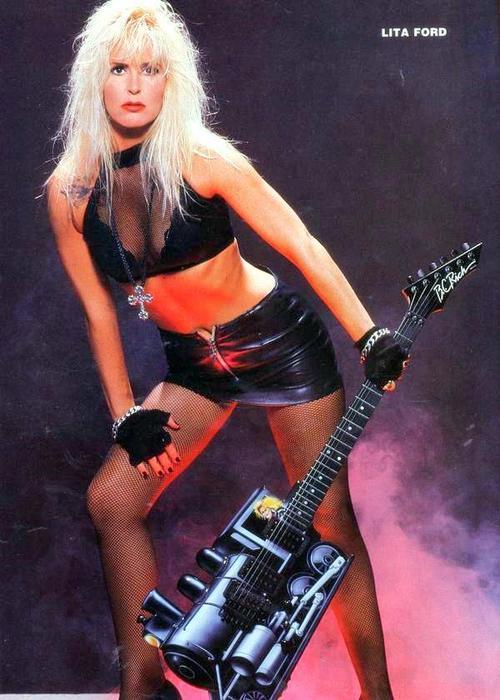
« We somehow managed to use a band’s songs and videos—and more importantly, a band’s social posture—to get an image of what kind of women they preferred (or appeared to prefer). This goes back to the idea of thinking about pop culture even when it isn’t there; with only scraps of information, metal followers were able to construct the sexual appetites of their favorite musicians. Here’s a list of what type of girls the premier metal groups liked (or at least seemed to like) …
GUNS N’ ROSES: Bisexual models; submissive women; girls who would buy them booze.
MÖTLEY CRÜE: Strippers; women who have sex in public (particularly elevators); lesbians.
RATT: Hookers with a heart of gold. Or strippers with a heart of gold. Or thirteen-year-olds.
WARRANT: Virgins who exhibited the potential to become nymphomaniacs.
DEF LEPPARD: Drunk girls; female vampires.
THE CULT: Female vampires only.
FASTER PUSSYCAT: GNR rejects.
W.A.S.P.: Magician’s assistants; women with rape fantasies; lower primates.
AEROSMITH: Models, but not waifs; high school snobs; more girls who like having sex in elevators.
CINDERELLA: Gypsies.
TESLA: Farm girls; whoever they used to date in junior high.
SKID ROW: Nameless, faceless, top-heavy sex machines (with hearts of gold).
BULLETBOYS: Girls with particularly deep birth canals.
L.A. GUNS: Drug-addled hitchhikers who like rough sex.
BANG TANGO: Faster Pussycat rejects.
VAN HALEN: Party girls; bikini models; the homecoming queen; cast members of One Day at a Time.
DAVID LEE ROTH (solo): The same as Van Halen, except with bigger boobs.
BON JOVI: The girl next door.
VINNIE VINCENT INVASION: The dominatrix next door.
SLAUGHTER: Girls who couldn’t make the cut as Bon Jovi groupies.
WINGER: Whoever Bon Jovi groupies used to baby-sit.
POISON: Girls who liked to tease; girls from small towns; good girls gone bad.
KISS: Any girl who wasn’t dead.
IRON MAIDEN: Dead girls.
JUDAS PRIEST: Boys.
METALLICA: None of the above. »

« Certainly, ’80s metal was almost always about sex. And—certainly—that sex was almost always described from the perspective of a man. But does this automatically mean it’s sexist? Do those elements automatically make anything (or everything) that comes with it a sexist art form?
Probably.
I suppose any opinion that comes almost exclusively from one gender is going to be sexist, although the term “genderist” would technically be more accurate. This is amplified when the subject is physical intercourse; few aggressive opinions can be safely expressed about sex, and never by guys like Sebastian Bach.
I’ve always been baffled by—and strangely attracted to—feminists. It’s hard not to notice their amusing hypocrisies more than their “confrontational” ideas, as is typical of most people who hold strong opinions. Feminists are one of the three kinds of people who express the most outrage over the sexual content of metal music. The other two groups are right-wing Christian conservatives (who express outrage over pretty much anything that’s remotely interesting), and pseudo-intellectual male academics (who share my attraction to feminists but actively try to do something about it). I am most interested in the arguments from classic feminists; I use the modifier “classic” to differentiate between prototypical ERA types, like Gloria Steinem, and those so-called neo-conservative feminists like Camille Paglia (neo-conservatives like Paglia tend to adore cock rock and seem just as crazy as classic feminists, but in a good way).
I never give any credence to the anti-metal arguments from Christian conservatives or sensitive male feminists. The first group bases its stance on an enforced morality, and the second group holds their argument because they think it somehow makes them seem smart. Neither has any idea what they’re talking about. I will, however, listen to antimetal arguments made by classic female feminists (and I have on countless occasions). The problem is that—no matter how intelligent they may be—they inevitably attack the same ideas they typically support. It’s kind of like whenever abortion opponents argue in favor of capital punishment, or when ardent pro-choice types talk about the inhumanity of the death penalty. The philosophical inconsistency always overwhelms the potential for logic.
Often, feminists go after the alleged misogyny in metal with a stock argument that’s hard to counter: “If I’m offended by it,” they say, “then that is proof enough.” The thinking is that the only criterion for what is offensive is that someone was offended by it. In a linguistic sense, the argument makes perfect sense. In reality, it means less than nothing. In fact, this kind of thinking is the worst thing that has happened to language, publishing, and damn near everything else in society over the last twenty years. If you are personally offended by the “Hot for Teacher” video, it might be because the video is sexist. It also might be because you’re the kind of person who is easily offended. Or it might even be because you’re fucking crazy. But regardless of how you feel, your personal feelings do not constitute an argument over whether something is sexist.
A slightly more compelling argument (the operative word being “slightly”) is that metal was sexist for “contextual” reasons. The suggestion is that it inevitably placed sex in a context that made women objects or victims (or at the very least secondary to the existence of a man). I suppose this is somewhat true. I slip into that argument when I write about Lita Ford. It’s hard to imagine rock music done any other way, though. That’s the nature of personal art. Liz Phair certainly sings everything through the eyes of a woman, and her narratives sometimes portray men as jerks and manipulators. Chrissie Hynde does that same thing—yet I would never assume the Pretenders were sexist. That’s just the way songwriting works. When I try to think of pop songs that objectively paint both sides of a relationship, the only one I can come up with is that tune from the Human League where the girl was working as a waitress in a cocktail bar.
But this much is true: There is an undeniable difference between someone like Chrissie Hynde and someone like Jani Lane (despite the fact that they both happen to hail from Akron, Ohio). The difference is simple. Chrissie seems smart, Jani seems stupid. This does not mean that Chrissie is smart or that Jani is stupid; it merely means that it seems that way. So when Warrant sang about sex, they came across as mindlessly horny musk oxen. The reason they were popular is that they fully recognized this perception and used it to their advantage. Like any smart metal band, they marketed their weakness into a strength. »
Fargo Rock City, Chuck Klostermann, 2001.

DERNIERS COMMENTAIRES